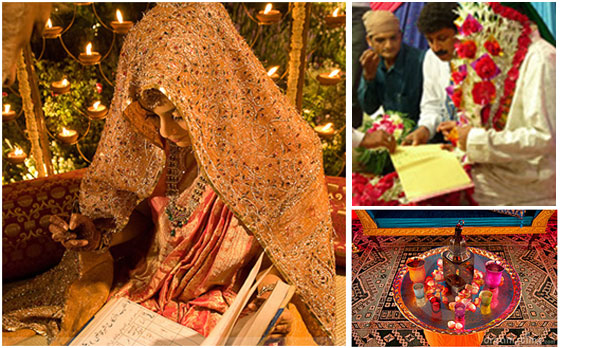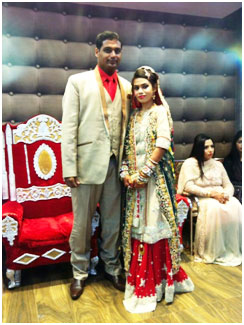Marriages in Islam – Union of the Souls
 “I created you from one soul and from the soul I created its mate so that you may live in harmony and love,” translates M.H. Shakir from the Quran.The Quran states that the husband and the wife are made for each other and meant to protect and comfort each other. Yes, we are right now talking about weddings in the Muslim community.Marriages are considered to be one big occasion in all the communities. Marriages signify a soul-to-soul union of not only the bride and groom but of the two families as well. This ideology is followed and believed in Islam as well as some other religions.
“I created you from one soul and from the soul I created its mate so that you may live in harmony and love,” translates M.H. Shakir from the Quran.The Quran states that the husband and the wife are made for each other and meant to protect and comfort each other. Yes, we are right now talking about weddings in the Muslim community.Marriages are considered to be one big occasion in all the communities. Marriages signify a soul-to-soul union of not only the bride and groom but of the two families as well. This ideology is followed and believed in Islam as well as some other religions. A typical Nikah requires the consent of both parties. This involves two adult Muslim witnesses of sound mind (Ash-Shuhud) usually two males or a male and two females; and the payment of Mehr (marriage gift) by the groom to the bride. The ceremony may also have the presence of the bride’s legal guardian (Wali); a written marriage contract (Aqd-Nikah), which is signed by the bride, groom and the witnesses; a scholar to officiate the ceremony, most often an Imam and a sermon (Khutba-tun-Nikah) to bless the marriage.
A typical Nikah requires the consent of both parties. This involves two adult Muslim witnesses of sound mind (Ash-Shuhud) usually two males or a male and two females; and the payment of Mehr (marriage gift) by the groom to the bride. The ceremony may also have the presence of the bride’s legal guardian (Wali); a written marriage contract (Aqd-Nikah), which is signed by the bride, groom and the witnesses; a scholar to officiate the ceremony, most often an Imam and a sermon (Khutba-tun-Nikah) to bless the marriage. Pre-Wedding Rituals:Sangeet, Haldi and Mehendi ceremonies are celebrated in some Muslim communities, too. Another similarity with other communities is that before the actual wedding ceremony, the groom is brought to the wedding venue, at home or Masjid, in a baraat. Baraat or the wedding convoy is a grand affair, where the groom is seated in an open car and other guests from his side, walk slowly along with the specially decorated vehicle. At the venue, the groom and the bride’s brother share a sherbet and the bride’s sisters playfully hit the guests with flower-filled cudgels!The Main Ritual:During this ritual, men and women are separately seated. The Nikah is a simple ceremony in which there is the Al-Ijab wal-Qubul (offer and acceptance) only, when the Wali (woman’s guardian in marriage) offers the bride to the groom, who then accepts.
Pre-Wedding Rituals:Sangeet, Haldi and Mehendi ceremonies are celebrated in some Muslim communities, too. Another similarity with other communities is that before the actual wedding ceremony, the groom is brought to the wedding venue, at home or Masjid, in a baraat. Baraat or the wedding convoy is a grand affair, where the groom is seated in an open car and other guests from his side, walk slowly along with the specially decorated vehicle. At the venue, the groom and the bride’s brother share a sherbet and the bride’s sisters playfully hit the guests with flower-filled cudgels!The Main Ritual:During this ritual, men and women are separately seated. The Nikah is a simple ceremony in which there is the Al-Ijab wal-Qubul (offer and acceptance) only, when the Wali (woman’s guardian in marriage) offers the bride to the groom, who then accepts. Mehr:As per Quran, Mehr must form part of the marriage contract. The groom gives Mehr to his bride as a demonstration of his commitment to her and to provide for her. It could be money, property or possessions. The groom may either pay the Mehr before he marries, at the time of marriage or at a later date. The Nikahnama or Aqd-Nikah or the marriage contract is signed by the couple, their fathers and the Maulvi. Arsi Musaf:After signing of the Nikah and prior to Ruksati. The bride and Groom see each other’s faces in a mirror placed on their laps. Traditionally it is the first time that they each other after the signing of the Nikah and before Rukhsati.
Mehr:As per Quran, Mehr must form part of the marriage contract. The groom gives Mehr to his bride as a demonstration of his commitment to her and to provide for her. It could be money, property or possessions. The groom may either pay the Mehr before he marries, at the time of marriage or at a later date. The Nikahnama or Aqd-Nikah or the marriage contract is signed by the couple, their fathers and the Maulvi. Arsi Musaf:After signing of the Nikah and prior to Ruksati. The bride and Groom see each other’s faces in a mirror placed on their laps. Traditionally it is the first time that they each other after the signing of the Nikah and before Rukhsati.
 The Reception:Later, the bride is brought to her husband’s place, where his mother holds a copy of the Quran over her head. Finally, the boy’s side hosts the Valima or the Dawat-e-Valima, the wedding reception.The Valima gives family members and friends the opportunity to congratulate the happy couple: the women of her family and friends congratulate the bride; the groom receives congratulations from men. The newlyweds are also presented with gifts.
The Reception:Later, the bride is brought to her husband’s place, where his mother holds a copy of the Quran over her head. Finally, the boy’s side hosts the Valima or the Dawat-e-Valima, the wedding reception.The Valima gives family members and friends the opportunity to congratulate the happy couple: the women of her family and friends congratulate the bride; the groom receives congratulations from men. The newlyweds are also presented with gifts.

